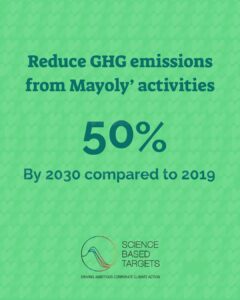
Mayoly is reaching an important milestone in its commitment to the energy transition and the fight against climate change. We are proud to announce that our near-term decarbonization trajectory, aimed at limiting global warming to 1.5°C by 2030, has been validated by the Science Based Targets initiative (SBTi).
This validation confirms our desire to combine economic growth and environmental responsibility and reflects on the need for decisive action to limit the global temperature increase and call on all our stakeholders to take similar steps.
By significantly reducing our greenhouse gas (GHG) emissions, we are actively participating in the global effort to combat global warming.
An ambitious trajectory by 2030, Mayoly is committed to:
- Reduce our GHG emissions from scopes 1 and 2 by 50% (direct and indirect emissions linked to the energy used)
- Reduce our emissions linked to the supply chain (scope 3) by 55% per million euros of added value
The climate emergency pushes us to act now. Every action counts for a greener future. These priorities transform the way we operate, from resource management to the way we produce, distribute our products and manage our vehicle fleet.
Review of our actions in 2024
- A strengthened eco-responsible approach: 100% renewable electricity and a responsible purchasing charter
As part of our commitment, we have taken several immediate and concrete measures. Since January 2024, all our industrial sites have been powered by 100% renewable electricity (ENR), an important step in optimizing our energy consumption and reducing our carbon footprint as a preamble to our energy sobriety plan and decarbonization roadmap developed this year.At the same time, we have implemented a responsible purchasing policy in 2024. More than 50% of our suppliers have already signed this charter, allowing us to guarantee that our supply chain meets the highest environmental and social standards. This approach reinforces our commitment to a more sustainable future at every stage of our operations.
- Why is a carbon footprint essential for a company?
A carbon footprint is a key tool for understanding a company’s impact on the climate. It measures the GHG emissions generated by the company, whether direct or indirect. To achieve effective decarbonization objectives, it is essential to know precisely where these emissions come from. This assessment helps us to set clear objectives, such as those validated by the SBTi, and to adjust our actions accordingly.
- Why it is urgent to act?
Climate change is a global and urgent challenge. Each company must take its share of responsibility to limit its impact. By reducing its GHG emissions and pollution across its entire value chain, a companynot only contributes to the fight against global warming and the preservation of the environment and the health of all living things, but it also meets the growing expectations of stakeholders – customers, investors, and regulators. For MAYOLY, acting now as a responsible player means being ready to seize the opportunities of a market that is increasingly focused on sustainability.
- An inspiring model for the sector
With this validation, MAYOLY joins a global movement of decarbonization in the pharmaceutical industry. Our trajectory validated by the SBTi is a model of strong commitment, illustrating our desire to play a leading role in the ecological transition of our sector. At MAYOLY, we are convinced that every action counts. Our commitment to decarbonization will contribute to building a more environmentally sustainable future.
- Our 2023 carbon footprint
Under the SBTi initiative, total reported emissions are 80,008 tonnes of CO2 for 2019 and 82,014 tonnes of CO2 for 2023 respectively.
Scopes 1 and 2 emissions: down -18% in 2023 compared with 2019 (7985 TCO2eq. in 2023 vs. 9761 TCO2eq. in 2019), in line with our trajectory.
Scope 3 emissions per million euros of added value: -5% in 2023 vs. 2019.
As for our ambition to reduce our scope 3 emissions associated with the purchase of goods and services, the transport and distribution of our products, business and personal travel, waste and the end-of-life of products, we are at the very beginning of the journey.

